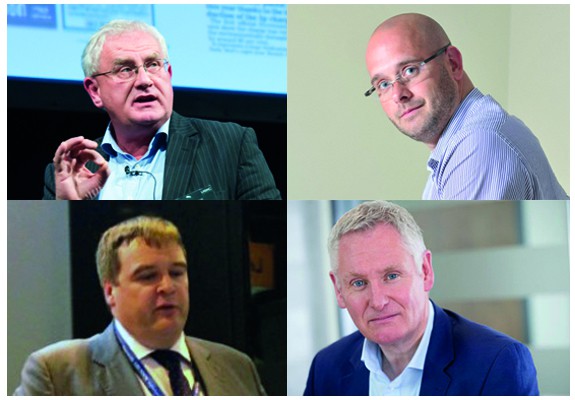Senior waste industry figures have welcomed recognition from the government for the sector as a priority area for infrastructure development in the Treasury’s Autumn Budget Statement.
Chancellor Philip Hammond delivered his Autumn Statement in Westminster yesterday (23 November), which suggested infrastructure development will be focussed in a number of strategic economic areas, namely transport, energy, flood defences, water, digital communications and waste (see letsrecycle.com story).

Responding to the Chancellor’s 2016 Autumn Statement are: (clockwise from top left) Steve Lee, R&WUK; Kristian Dales, FCC; David Palmer-Jones, Suez; and, Colin Church, CIWM
This will be headed by the government’s National Infrastructure Commission – a body set up by the Treasury to funnel spending into key areas. Central government investment in infrastructure is expected to total £22 billion by 2020.
Recognition of waste as one of the six infrastructure priorities has been welcomed by some of the senior figures within the waste industry, with Suez’s David Palmer-Jones among those to applaud the Treasury’s focus.
However, Mr Palmer-Jones warned that any focus on developing waste infrastructure will need to be allied with a clear waste strategy from government.
He said: “The government has recognised in the autumn statement the vital roles both water and waste play in the UK economy and Suez, as one of the country’s largest recycling and resource management firms, is pleased that both resources have been included in the National Infrastructure Commission’s definition of Economic Infrastructure.
“We still need more long term strategic vision and detail at a national level to ensure waste is treated fully as a resource for both secondary raw materials and energy, so that we in the private sector can continue to invest in the long term infrastructure required to help transition the UK to a more fully circular economy, yielding more economic productivity and jobs creation.”
Steve Lee – the director general of the lobbying group Resources & Waste UK – a joint venture set up by the Chartered Institution of Wastes Management (CIWM) and Environmental Services Association (ESA) – has also highlighted the need for a coherent policy strategy encompassing the waste sector in his response to yesterday’s Budget proposals.
Brexit
Commenting on the wider economic context of the measures, he said: “In light of Brexit uncertainty, one of the Chancellor’s key tasks today was to outline measures to ensure that UK industry is competitive, efficient and resilient in the future, and R&WUK is pleased to see the commitment to infrastructure and to the important work of the National Infrastructure Commission, which has waste as one of its six priority areas.
He added: “In the context of promoting growth, however, there was no mention of the forthcoming industrial strategy, and no reference to the important interplay between the economy and the environment. Sustainable growth must be viewed through a lens that takes account of future resource constraints and climate change impacts. Given that there is growing recognition of this imperative across the globe, it is disappointing not to see this reflected, at least at a high level, in today’s announcement.”
Mr Lee claimed that the waste and resources industry would hope to see a ‘stronger focus’ on sustainable growth in Defra’s 25 year Environment Plan and BEIS’ industrial strategy – two areas where RWUK is likely to focus its lobbying activities.
Consultation
Kristian Dales, sales and marketing director at FCC Environment, also welcomed the Chancellor’s recognition of waste as a key infrastructure priority, but called for consultation with industry to ensure that growth is delivered in the right areas.
“We are encouraged to see the Government recognise the importance of waste in delivering a national infrastructure plan that works for Britain, which could enable our industry to deliver 50,000 new jobs and boost GDP by an additional £3bn.”
Kristian Dales
FCC Environment
Responding to yesterday’s Budget proposals, Mr Dales said: “We are encouraged to see the Government recognise the importance of waste in delivering a national infrastructure plan that works for Britain, which could enable our industry to deliver 50,000 new jobs and boost GDP by an additional £3bn.
“We would urge the government to continue to foster its relationship with industry so that our sector can fully capitalise on its ability to improve the UK’s energy and resource security.”
Newly appointed CIWM chief executive Colin Church – a former senior civil servant within Defra – said that the Chancellor’s focus had ‘rightly’ been on setting a ‘stable course for the economy’, but Dr Church expressed concern that there was no specific mention of climate change within the Budget speech.
He also echoed Mr Lee’s disappointment over the lack of detail over the government’s industrial strategy.
Productivity
He said: “Productivity is not just about how much we can ‘make’ but also about how we make it. Ultimately, sustainable growth is predicated on UK industry having access to a range of appropriate resources, and this includes the valuable secondary feedstock materials and energy products that the waste and resource management sector can deliver.
“It is to be hoped that somewhere in the emerging detail over the coming months, resource productivity will be clearly identified as one of the priorities, especially given the impact that volatile commodity markets and potential Brexit-related raw material price rises could have on UK plc.”
The post Treasury spotlight on waste infrastructure welcomed appeared first on letsrecycle.com.
Source: letsrecycle.com Waste Managment



